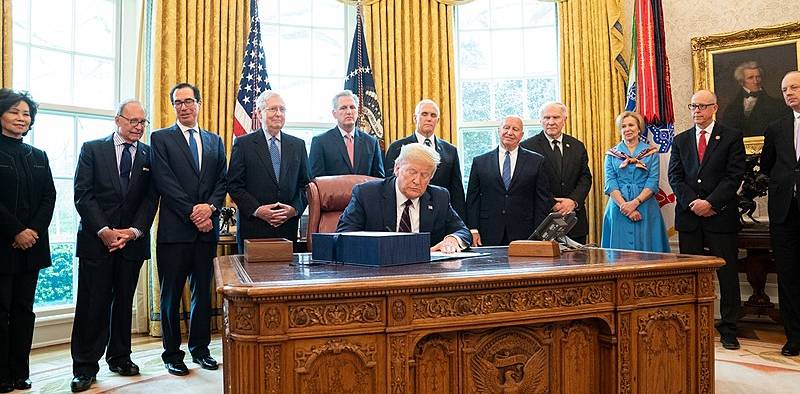Congress Preparing Next Relief Package for Small Businesses and Hospitals

Bipartisan efforts in Congress could result in another relief package this week. President Donald Trump and leaders from both parties have spoken optimistically about the prospect of passing a $450 billion aid package designed exclusively for small businesses and hospitals.
Refilling the Tank
The package will replenish the small business loan fund that was established by the CARES Act. Previously, the economic relief bill created the Paycheck Protection Program with $349 billion, but that money ran out on Thursday, the Associated Press reported. Roughly 1.7 million loans were granted through the program. The next round of relief will allocated $300 billion for the Paycheck Protection Program.
It will also provide $50 billion for Small Businesses Administration Economic Injury Disaster Loans (EIDL). The CARES Act granted expanded access to the loans for churches and nonprofit organizations. EIDLs can be used to cover operating expenses and payroll.
The deal would assist hospitals as well by providing $75 billion to keep medical facilities afloat. Since the COVID-19 pandemic forced hospitals to suspend profitable elective surgeries, many have experienced a revenue loss while simultaneously facing rising expenses to handle coronavirus cases, the Associated Press reported.
Furthermore, the aid package will allocate $25 billion for COVID-19 testing. Currently, the US lags behind other developed nations in testing capacity. The Centers for Disease Control and Prevention has performed 1 test per 1,000 persons compared to 5.5 in the UK, 14 in Canada, and 22.1 in Italy, according to Statista.
Governors Want More
Testing has been a sticking point between the White House and state governors. Trump said the Defense Production Act will solve the shortage.
“We already have millions coming in,” Trump said. “In all fairness, governors could get them themselves. But we are going to do it. We’ll work with the governors and if they can’t do it we’ll do it.”
Some Democratic governors disagreed about the availability of tests and the lack of money for their state governments.
“We are fighting a biological war,” said Gov. Ralph Northam of Virginia. “We have been asked as governors to fight that war without the supplies we need.”
New York Gov. Andrew Cuomo was also critical of the President and legislators for failing to provide financial relief. New York is bearing the brunt of the COVID-19 pandemic with nearly half of all US deaths occurring within the state.
“You have the president saying 15 times, ‘It’s up to the governors, it’s up to the governors, it’s up to the governors,’” Cuomo said. “And then they’re going to pass a piece of legislation that gives you know what to states: zero, zilch, nada, niente. Whatever language you want to say it, nothing.”
Treasury Secretary Steven Mnuchin said it’s possible that funding for state governments and food stamps could be targeted with the next relief bill, but he and Sen. Majority Leader Mitch McConnell, R–Ky., made it clear the priority now is small businesses and hospitals. Trump also acknowledged the calls for funding state and local governments and said “that will be in our next negotiation,” the New York Times reported.
‘Very Close’
Criticism from the governors not withstanding, both parties on Capitol Hill have found agreement for the next aid package.
“Many of the things [Democrats] have asked for on the banking side, on the testing side, on the hospital side, [Republicans] going along with,” said Senate Minority Leader Chuck Schumer, D–N.Y. “So we feel pretty good. We still have a few more issues to deal with.”
“We are very close to a deal,” Trump said Sunday during his coronavirus briefing. Reaching that point, however, involved a minor showdown between both parties that found Speaker of the House Nancy Pelosi, D–Cali., in the hot seat. At the center of the debate was funding for state and local governments, for which Pelosi pushed for $150 billion.
“Nancy Pelosi is blocking it. She sits in her house in San Francisco, overlooking the ocean, and she doesn’t want to come back. She doesn’t want to come back,” Trump said Saturday.
Pelosi responded that all of Congress’ coronavirus relief bills have been bipartisan efforts and said she doesn’t “pay much attention to the president’s tweets against me…he’s a poor leader.”
She also said the House could switch to proxy voting if the Rules Committee approves the change. The voting method would allow for some legislators to avoid returning to the Capitol and vote remotely, but would only apply for emergency legislation for COVID-19. Legislators can pass the bill without a roll call vote if the voting is unanimous, but Democrats anticipate at least one Republican to dissent, POLITICO reported.
The Senate was scheduled to read the bill in a pro forma sessions on Monday and the House could vote as early as Wednesday, said Majority Leader Sten Hoyer, D–Md.
“We’re all on board with the same plan,” Mnuchin said on CNN’s “State of the Union” on Sunday.















